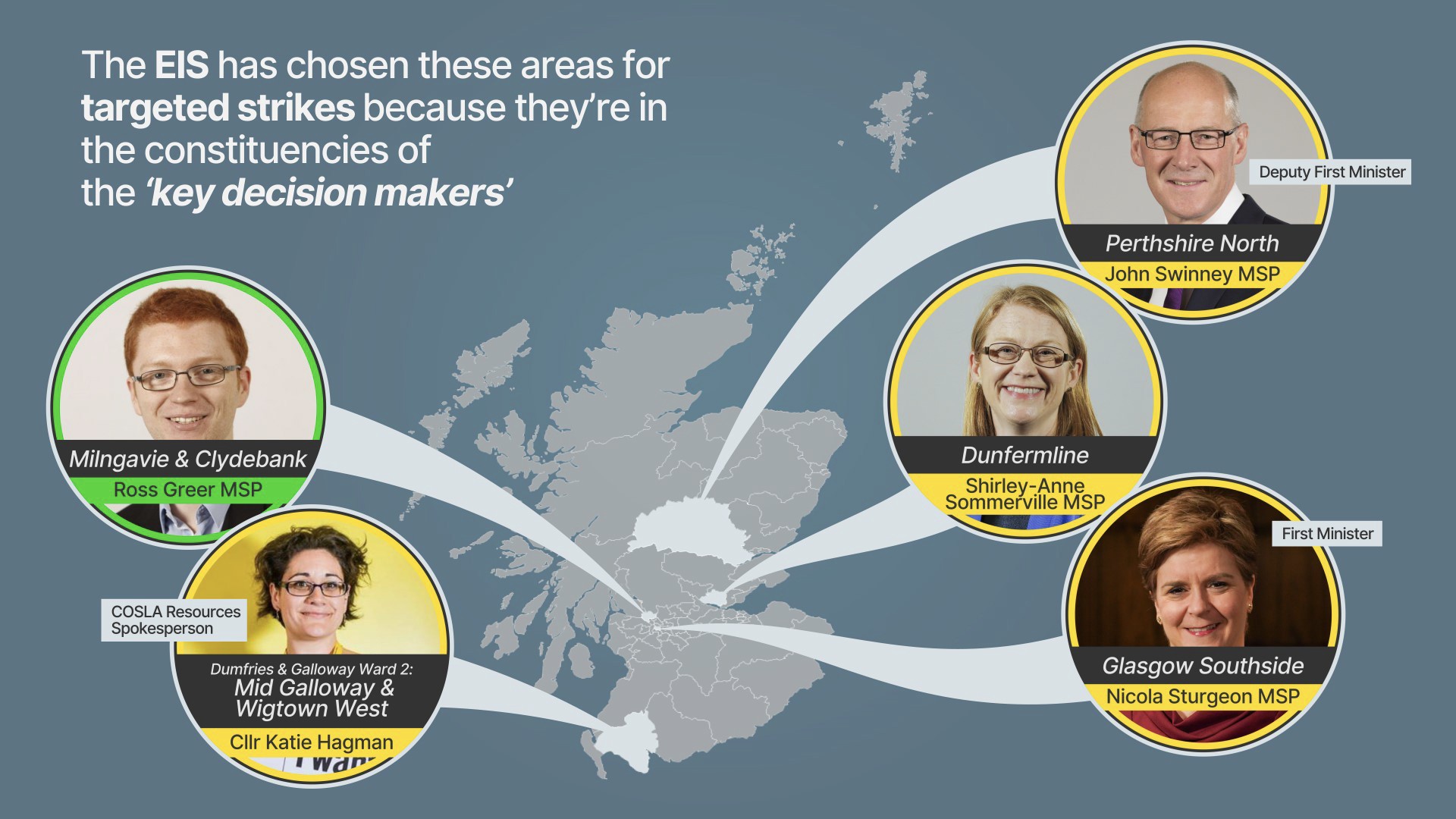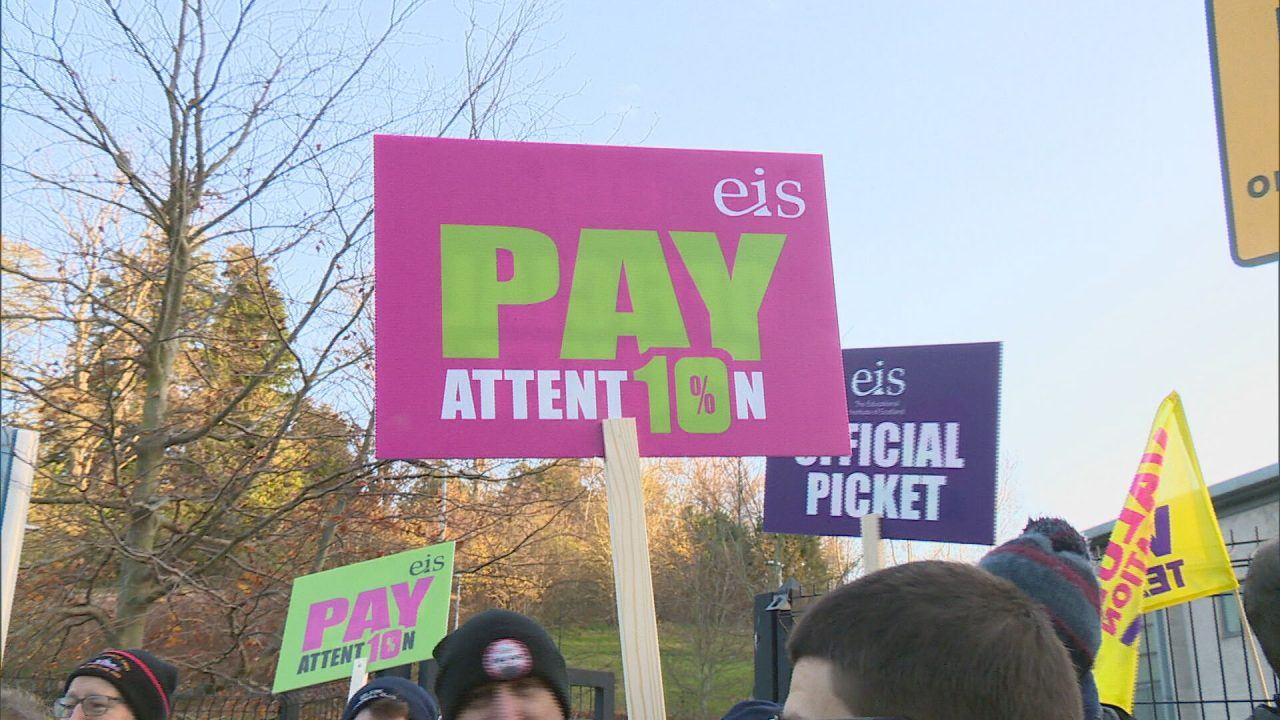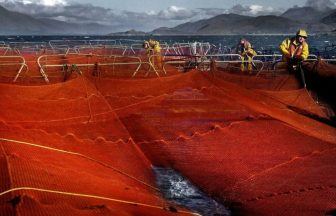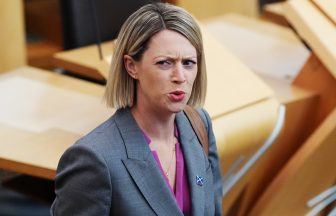Parents and pupils in areas affected by targeted school strikes say they are wracked with worry as the industrial dispute shows no sign of reaching a conclusion.
The Educational Institute of Scotland (EIS), the country’s largest teaching union, says it has been left with no option but to escalate strike action as it continues to push for an improved pay offer.
Last week, the Scottish Government put forward an 11.5% increase over two years but it was rejected and described as “not good enough”.
Under the plans, teachers earning up to £80,000 would see their pay go up by 6% from April 2022, and then another 5.5% in the new financial year.
The EIS has been asking for a 10% pay rise and the union is now singling out the constituencies of First Minister Nicola Sturgeon, deputy first minister John Swinney, education secretary Shirley-Anne Somerville, Scottish Green education spokesman Ross Greer and Katie Hagmann, the resources spokeswoman for local authority body Cosla.
A further three days of strike action will again take place in those areas as well as Hagmann’s Mid Galloway and Wigtown West ward in Dumfries and Galloway between March 7-9.
The move has sparked anxiety and anger in local communities up and down the country.
 STV News
STV NewsThe EIS rejected the most recent pay offer of 11.5% over two years, without putting it to members. Another union, NASUWT, did let them decide, but members also turned it down.
STV News spoke to union leaders, politicians, pupils and parents to gauge how they are feeling about the targeted strikes, the latest escalation in a long-running row.
Glasgow Southside – Nicola Sturgeon’s constituency
Anna McFadyen, an S5 pupil at Holyrood Secondary School, is at a crucial stage in her education.
She is currently studying for her Highers in May but her studying is being disrupted because her school lies in the First Minister’s Glasgow Southside constituency.
Anna said: “It’s really stressful with exams coming up and especially because other schools aren’t having these targeted strikes, so we’re being affected disproportionately.
“We’re quite worried that we won’t be able to finish courses – it’s quite a lot of pressure at the moment. It’s trying to balance which subjects you should be studying for or preparing ahead for – it’s really difficult to get that time management sorted.
“Due to targeted strikes alone, I’ll be missing 39 periods of school and we can’t work through problems in maths, for example, if we don’t know where we’re going wrong – we don’t have that help.
“I completely support the teachers’ right to strike. It’s just the targeted strikes because my school is in a really disadvantaged area and a lot of children struggle from socio-economic inequality. We’re already at a disadvantage so to be impacted by these strikes when other schools aren’t, it’s really hard for us to understand. It’s a really difficult time for us to navigate through.”
Perthshire North – John Swinney’s constituency
Patience is also wearing thin for patients.
Amy Gadsden’s ten-year-old son Ben will miss eight of the next 13 days of school due to the targeted action.
She supports the strike but has started a petition calling for children with additional needs to be protected from the disruption.
Ms Gadsden told STV News: “Ben is autistic and really, really struggles with a changing routine and for the next three weeks there’s a lot of strike action, which throws that in the air.
“This week alone, my son is only at school yesterday and today (Tuesday and Wednesday) – the thought of him not being at school Wednesday, Thursday and Friday is already distressing him. He’s struggling massively with that.
“It’s not been easy, it has not been great for him. There’s a lot of anger and frustration. He’s only just recently settled at his new school, where he feels part of it and understands things, and he is now thrown out of that routine.
“As much as you try to keep them in a routine at home, the routine is never what they expect it to be on that day. I just want him (John Swinney) to really reconsider how badly affected these children are.
“I fully agree with the teachers striking – they deserve to be paid. The stuff that I have seen that they deal with, especially with my child when he was in mainstream (education). To be in an environment where these children are really seriously struggling and not get paid enough for it and be fully responsible for our children’s education, but have to fight for that.
Milngavie and Clydebank – Ross Greers’ constituency
EIS general secretary Andrea Bradley said: “It’s only been since the announcement of this targeted action that any improvement has been offered. It has been a very, very modest improvement but not enough. It’s a baby step in the right direction but we need to see strides in the right direction in order to bring forth a resolution in this dispute.
“The reason why we have chosen to escalate the action in this way is because we want to focus the pressure on key decision-makers within the Scottish Government and Cosla, who have so far been withholding the necessary resource to bring this dispute to a resolution.
“We understand the anxieties of children and young people, we understand the anxieties of parents around this. Teachers are anxious about this too but they are left with no option but to escalate the action – given the intransigence of the Scottish Government and Cosla over a long number of months.
“Every negotiation features an element of compromise but 6% is not enough of a compromise on the part of the Scottish Government – 6% still falls far short of inflation, it is less than probationers were offered last time around and it is less by way of an increase than the money saved by councils through the three days of national teacher strikes so far.
“Teachers are always anxious about any disruption to education, any disruption to young people’s learning and that’s particularly the case in the lead-up to exams. It’s really important to remember that teachers lodged this pay claim before the last exam diet – we waited patiently all through the last exam diet, 2022, but it was only some weeks into that 2022 exam diet that the very first paltry offer of 2% was submitted by the Scottish Government and Cosla.”
Dunfermline – Shirley-Anne Somerville’s constituency
Emily McMenamin, a music teacher at Queen Anne High School in Dunfermline, doesn’t want to be on the picket line.
She would rather be back in the classroom helping her pupils prepare for crucial prelim exams. But she is also struggling with the cost of living and believes teachers deserve more money.
“With the cost of living crisis going up and up and up, our pay is not reflecting that. Since 2011, our cumulative pay has actually decreased by almost 30% – it’s just not matching what we need.
“We don’t want to strike, we don’t want to be out here. We want to be in there teaching the kids. We want the best for the kids. Ultimately, they are at the forefront of our minds but to make their education better we need this help.
“All of us are feeling the toughness if you like, there’s loads of us turning out today to support everybody. We are a team, we do this together. It’s important for us to fight for it because we deserve it. We were there all through Covid, helping the kids through their education during lockdown, going away above and beyond as always.
“But ultimately it seems that’s a total thing in the past and we are fighting for what we need. We need this 10%, we are not currently being listened to.”
Is the Scottish Government doing enough to end the dispute?
Education secretary Shirley-Anne Somerville said she is “bitterly disappointed” that the EIS “is threatening continued industrial action in the run up to the exam diet”.
She has appealed to teaching unions to suspend industrial action as pay talks continue.
Speaking to STV News, she said: “I think it is desperately disappointing that the EIS have continued with this action, despite the fact there was an offer on the table that I had hoped they would be able to take to members.
“This targeted action is very inequitable and it’s deeply disappointing to see children’s and young people’s education being affected once again.
“I think an offer of 6% one year, 5.5% for the next year, that would have given a cumulative increase of nearly 30% since 2018 for teachers. Now I think that was a good and a credible offer.
“We have compromised with this new offer, we have found more money to put on the table. I would simply ask that unions do the same – a 10% ask for one year is unaffordable for government and I think it’s important that we all need to compromise and find a way through this.”
Follow STV News on WhatsApp
Scan the QR code on your mobile device for all the latest news from around the country


 STV News
STV News
























